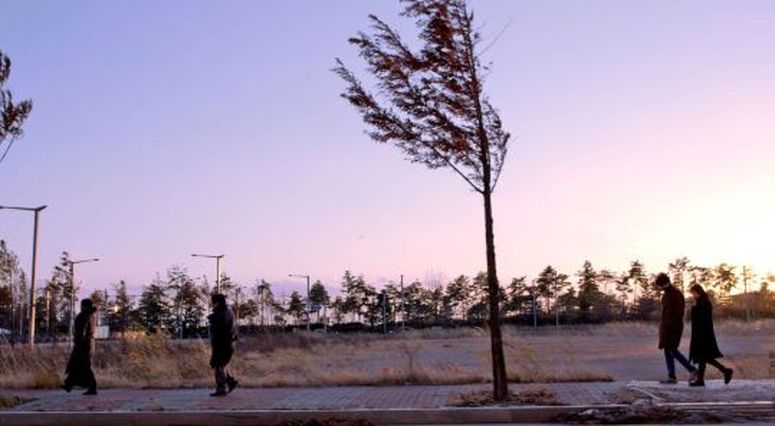|
An astute, observational study of the transitional time period between young adulthood and middle-age, Dae-hwan Kim's The First Lap subverts the traditional South Korean family drama in a host of ways, revealing a startling honest portrait of adulthood that bristles with honesty, humor, and emotional resonance. The story of young lovers whom have reached a crossroads, stuck in young adult malaise in which domesticated life feels pedestrian and/or restrictive, yet the directionless nature of youthful exuberance offers no better reprieve, Dae-hwan Kim's The First Lap reveals two characters desperately attempting to understand themselves and what they want out of life. They are each confronted with the need to understand themselves and what they want, due to their prolonged relationship and the possibility of children; do they wish to focus on personal interests, companionship, or domesticated family life the most, they don't seem to know. Through the interactions this couple has with both sets of their parents, The First Lap exhibits the true nature of life itself, revealing that there is no right way or correct way to live, deconstructing how we are all individuals simply trying to do what we believe is best for ourselves and the one's we love. Paternal and maternal instincts are heavily explored in The First Lap, as the film raises a host of fascinating assertions related to what effective parenting is and what it means, recognizing that it is about sculpting the young, inquisitive mind but doing so in a way that lets them create their own identity and image, one in which they can forge their own path. The dramatic beats of the film are heavily related to the maternal pressures felt by Ji-young, whose mother is let down by her slow track in life. This struggle is beautifully juxtaposed with Su-hyeon's own problems, being the son of a blue-collar family, one in which his parents live nothing more than a loveless relationship, a fact which seemingly makes the young man ashamed of his family, at least when compared to Ji-young's successful, happily married parents. Exploring the dichotomy between the two parents, one loveless marriage, one happily in love, The First Lap subtly elevates the stakes of the young couples stagnation, showcasing the complex nature of a decision such as marriage and childbirth, decisions which will undoubtedly effect them for the rest of their life. Exploring how our individualistic nature is sculpted and molded intentionally and unintentionally by our environment and parental upbringing, The First Lap manages to be a family drama with larger ambitions, touching on existential level assertions about the human condition. The final scene of The First Lap is a simple yet profound sequence that playfully showcases the film's overarching message- The young couple out at night in Seoul, at some form of outdoor festival, finds themselves going against the crowd. They repeatedly adjust, thinking that the way the crowd is going must be correct, yet after each adjustment their perspective reverses, leaving them to constantly think they are going against the crowd. No matter how times they change direction, it seems the crowd does too; it's a silly, charming scene that establishes the two characters commitment to each other, but even more importantly it is a simple yet startling allegory about life itself, one in which the "right way" doesn't exist, reminding us that we all must find our own path.
0 Comments
Leave a Reply. |
AuthorLove of all things cinema brought me here. Archives
June 2023
|

 RSS Feed
RSS Feed
